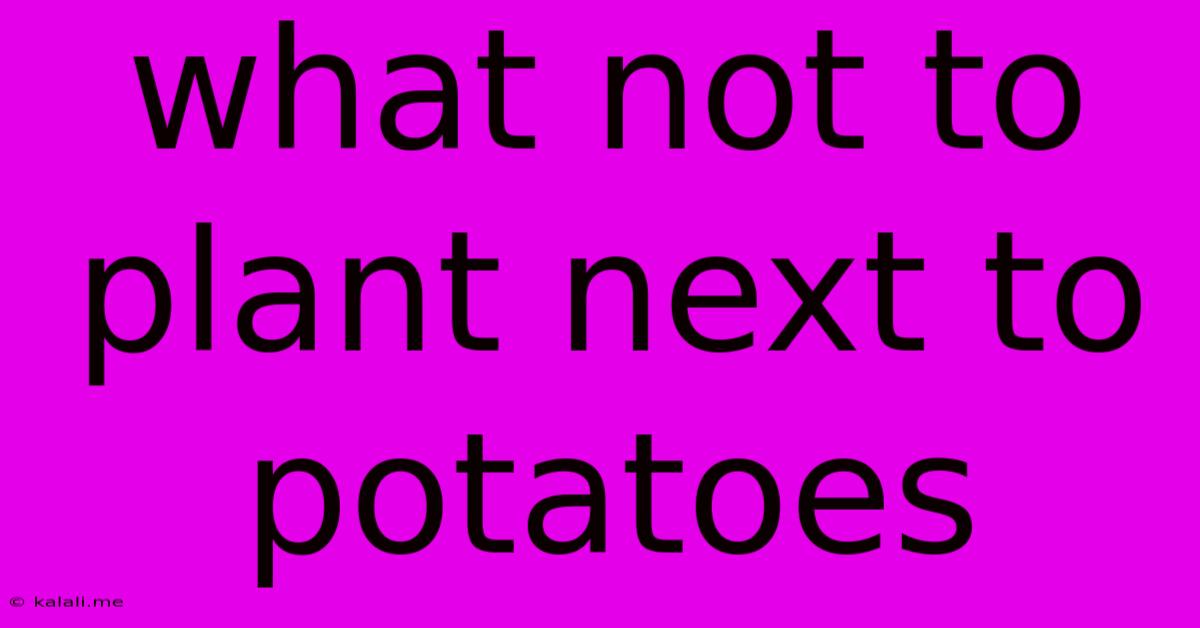What Not To Plant Next To Potatoes
Kalali
Jun 05, 2025 · 3 min read

Table of Contents
What Not to Plant Next to Potatoes: A Guide to Companion Planting Success
This guide explores the crucial aspects of companion planting, focusing on what vegetables and plants you should avoid planting near your potato crop. Understanding plant compatibility is key to maximizing your harvest and preventing common gardening problems. Poor companion choices can lead to reduced yields, increased pest infestations, and the spread of diseases. Let's delve into the plants that are best kept away from your potato patch.
Why Companion Planting Matters for Potatoes
Companion planting, the art of strategically positioning different plant species together, offers numerous benefits. It can improve soil health, deter pests, attract beneficial insects, and even enhance the flavor of your produce. However, some plant combinations are detrimental. For potatoes, choosing the right companions is crucial for a healthy and bountiful harvest.
Plants to Avoid Near Potatoes
Certain plants are known to compete with potatoes for resources or harbor pests and diseases that can harm your potato crop. Here are some key offenders:
-
Tomatoes: Both tomatoes and potatoes are heavy feeders, meaning they require significant amounts of nutrients from the soil. Planting them together leads to intense competition for essential nutrients, resulting in smaller, less productive potato plants. Furthermore, both are susceptible to similar diseases, increasing the risk of cross-contamination.
-
Eggplants: Similar to tomatoes, eggplants are also heavy feeders and share similar disease vulnerabilities with potatoes. Planting them together creates the same nutrient competition and disease risk, compromising the health and yield of both crops.
-
Peppers: Similar to tomatoes and eggplants, peppers compete heavily for nutrients and can share similar disease susceptibilities with potatoes.
-
Other Solanaceae Family Members: Potatoes belong to the Solanaceae family, also known as the nightshade family. Many plants in this family share similar disease vulnerabilities, making it unwise to plant them together. This includes tomatoes, eggplants, peppers, and even some ornamental plants. Planting these together increases the risk of disease transmission.
-
Sunflowers: While visually appealing, sunflowers are known to be heavy feeders and can potentially outcompete potatoes for essential nutrients, especially water, significantly impacting potato growth.
Understanding the Risks
Planting incompatible plants next to potatoes increases the risk of several issues:
- Nutrient Depletion: Heavy feeders deplete the soil of essential nutrients, leaving your potatoes with less to thrive on.
- Pest and Disease Transmission: Some plants can harbor pests or diseases that easily spread to potatoes, damaging the crop and reducing yields.
- Competition for Resources: Plants with similar needs (water, nutrients, sunlight) will compete for these resources, resulting in stunted growth and reduced yields for both plants.
Better Companion Plants for Potatoes
Instead of focusing on what not to plant, consider choosing plants that benefit your potato crop. These include:
- Legumes (Beans, Peas): Legumes fix nitrogen in the soil, enriching it for potatoes.
- Marigolds: Known for their pest-repelling qualities.
- Alliums (Onions, Garlic, Chives): Their strong scents deter many common potato pests.
By carefully selecting your companion plants, you can create a thriving and productive garden that yields healthy and abundant potatoes. Remember to research and choose companion plants suitable for your climate and growing conditions. Happy gardening!
Latest Posts
Latest Posts
-
Does Quinoa Need To Be Refrigerated
Jun 06, 2025
-
How To Remove A Broken Metal Screw
Jun 06, 2025
-
Your Throne O God Is Forever And Ever
Jun 06, 2025
-
Hybrid Stepper Motor With Elliptical Magnetic Field
Jun 06, 2025
-
Can Electric Arc Furnaces Make Steel From Iron Ore
Jun 06, 2025
Related Post
Thank you for visiting our website which covers about What Not To Plant Next To Potatoes . We hope the information provided has been useful to you. Feel free to contact us if you have any questions or need further assistance. See you next time and don't miss to bookmark.